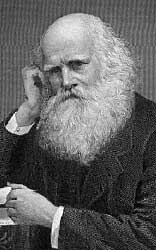 |
William Cullen Bryant (November 3, 1794 – June 12, 1878) was an American Romantic poet and journalist. His most famous poem was probably “Thanatopsis” which roughly translates as “Meditation upon Death”. It was a landmark for American poetry. |
William Cullen Bryant – Biography
William Cullen Bryant (November 3, 1794 – June 12, 1878) was an American poet and journalist.
He was born in Cummington, Massachusetts, the second son of Peter Bryant, a prominent doctor. His ancestors on both sides came over in the Mayflower. Educated at Williams College he went on to study law at Worthington and Bridgewater, he was admitted to the bar in 1815.
Interested in poetry since childhood, his first published work was a book of verse, The Embargo (1808) and his first critically acclaimed work was the poem “Thanatopsis” (1817) which appeared in the North American Review. Writing in a English romantic style and celebrating the countryside of New England his work was well received. He also wrote “Lines To a Waterfowl” Among his best known poems are also The Rivulet, The West Wind, The Forest Hymn, The Fringed Gentian.
He worked as a lawyer in Northampton, Plainfield, and Great Barrington until 1825 when he married and moved to New York City and worked for the New York Review and then the New York Evening Post.
At first an associate editor, he became editor in 1829 and remained in that post until his death, the driving force of a liberal and literate paper he was strongly anti-slavery.
Bryant was a lifelong political activist, initially as a proponent of the Free Soil Party, and later in life, as a founder of the Republican Party. He was a fervent supporter of Abraham Lincoln’s presidential bid in 1860.
In his later years, Bryant focused on translating and analyzing Ancient Greek and Latin works, such as The Iliad and The Odyssey of Homer.
Bryant died in 1878 of complications from an accidental fall.
Bryant’s muse is tender and graceful, pervaded by a contemplative melancholy, and a love of solitude and the silence of the woods. Though he was brought up to admire Pope, and in his early youth imitated him, he was one of the first American poets to throw off his influence. He had a high sense of duty, was a prominent and patriotic citizen, and enjoyed the esteem and even the reverence of his fellow-countrymen.
From: Short Biographical Dictionary of English Literature. A collection of biographies of writers by John W. Cousin
William Cullen Bryant Poems
- Consumption
- June
- November
- October
- Thanatopsis
- The Death Of Lincoln
- The Death Of The Flowers
- The Gladness Of Nature
- The Skies
- The Strange Lady
- To A Waterfowl
- To The Fringed Gentian
View: William Bryant Poems
Links
